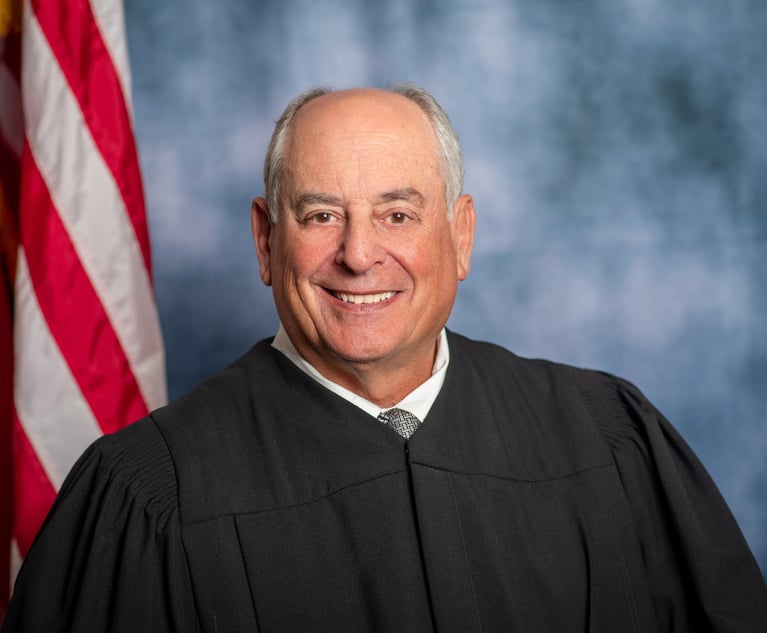 Fulton County District Attorney Paul Howard (Photo: John Disney/ALM)
Fulton County District Attorney Paul Howard (Photo: John Disney/ALM)Top Prosecutors to Help Nonviolent Offenders Restrict Records
"Curative justice events, such as record restriction fairs, can assist thousands of Atlantans in clearing non-violent misdemeanor arrests from their criminal histories, thereby providing another opportunity for success," Atlanta Solicitor Raines F. Carter said.
October 16, 2019 at 01:44 PM
3 minute read
Some of Atlanta's top prosecutors are offering a free legal clinic on Oct. 26 to help block access to criminal records for nonviolent offenders.
"Curative justice events, such as record restriction fairs, can assist thousands of Atlantans in clearing non-violent misdemeanor arrests from their criminal histories, thereby providing another opportunity for success," Atlanta Solicitor Raines F. Carter said in a news release about the event. "In the wake of criminal justice reform and the upsurge of harm reduction and reentry programs, now is an opportune time to offer hope through record restriction. These programs allow offenders a fresh start when it comes to employment and even housing."
Carter will provide information and assistance, along with Fulton County District Attorney Paul Howard and District 3 City Councilmember Antonio Brown.
In Georgia, state law does not use the word "expungement," Carter said. Instead, the process is now referred to as "record restriction." But he said only the name of the process has changed. Record restriction means that eligible records of official criminal history are restricted from public view and are only accessible to law enforcement for criminal justice purposes.
The event is to take place from 10 a.m. to 2 p.m. at Atlanta Municipal Court, Lenwood Jackson Sr. Justice Center, 150 Garnett St. S.W., Atlanta, GA 30303. Registration is open until Oct. 21 at: https://recordexpungement.eventbrite.com.
The symposium is open to all who have been arrested within the city limits of Atlanta and Fulton County. Preregistration will determine eligibility. Participants are asked to bring a copy of their criminal history from any local police station.
If the violation occurred before July 1, 2013, participants will need a certified disposition letter from the clerk of court, located on the second floor of Atlanta Municipal Court, mailed or delivered in advance to the Atlanta Police Department Identification Unit, 3493 Donald Lee Hollowell Pkwy. N.W, Atlanta, GA 30331.
If the violation occurred on or after July 1, 2013, participants may bring the letter and a copy of the criminal history to the symposium next Saturday. Those who have participated in a diversion program also are asked to bring a letter of completion signed by the program director, Carter said.
Cases eligible for restriction include:
- Possession of marijuana, less than an ounce (if the violation has not recurred within five years);
- Theft by shoplifting (up to the third conviction);
- Refund fraud (if the violation has not recurred within five years);
- Possession of drug-related objects (if the violation has not recurred within five years).
- Cases not presented to a grand jury;
- Dismissed cases;
- Not guilty pleas;
- Underage persons in possession of alcohol, (first offense); and
- Closed felony nonconvictions through various means—dead docket, decline to prosecute, dismissal, first offender, no bills, not guilty.
Those interested were directed to the Office of the Fulton County District Attorney website.
This content has been archived. It is available through our partners, LexisNexis® and Bloomberg Law.
To view this content, please continue to their sites.
Not a Lexis Subscriber?
Subscribe Now
Not a Bloomberg Law Subscriber?
Subscribe Now
NOT FOR REPRINT
© 2024 ALM Global, LLC, All Rights Reserved. Request academic re-use from www.copyright.com. All other uses, submit a request to [email protected]. For more information visit Asset & Logo Licensing.
You Might Like
View All
Georgia Supreme Court Honoring Troutman Pepper Partner, Former Chief Justice
2 minute read
'A 58-Year-Old Engine That Needs an Overhaul': Judge Wants Traffic Law Amended
3 minute read
Appeals Court Removes Fulton DA From Georgia Election Case Against Trump, Others
6 minute read
Family of 'Cop City' Activist Killed by Ga. Troopers Files Federal Lawsuit
5 minute readTrending Stories
- 1Data Breach Lawsuit Against Byte Federal Among 1,500 Targeting Companies in 2024
- 2Counterfeiters Ride Surge in Tabletop Games’ Popularity, Challenging IP Owners to Keep Up
- 3Health Care Data Breach Class Actions Saw December Surge in NY Courts
- 4Florida Supreme Court Disbars 3, Suspends 11, Reprimands 1 in Final Disciplinary Order of 2024
- 5Chief Justice Roberts Ends Year With Defense Against 'Illegitimate' Attacks on Judiciary
Who Got The Work
Michael G. Bongiorno, Andrew Scott Dulberg and Elizabeth E. Driscoll from Wilmer Cutler Pickering Hale and Dorr have stepped in to represent Symbotic Inc., an A.I.-enabled technology platform that focuses on increasing supply chain efficiency, and other defendants in a pending shareholder derivative lawsuit. The case, filed Oct. 2 in Massachusetts District Court by the Brown Law Firm on behalf of Stephen Austen, accuses certain officers and directors of misleading investors in regard to Symbotic's potential for margin growth by failing to disclose that the company was not equipped to timely deploy its systems or manage expenses through project delays. The case, assigned to U.S. District Judge Nathaniel M. Gorton, is 1:24-cv-12522, Austen v. Cohen et al.
Who Got The Work
Edmund Polubinski and Marie Killmond of Davis Polk & Wardwell have entered appearances for data platform software development company MongoDB and other defendants in a pending shareholder derivative lawsuit. The action, filed Oct. 7 in New York Southern District Court by the Brown Law Firm, accuses the company's directors and/or officers of falsely expressing confidence in the company’s restructuring of its sales incentive plan and downplaying the severity of decreases in its upfront commitments. The case is 1:24-cv-07594, Roy v. Ittycheria et al.
Who Got The Work
Amy O. Bruchs and Kurt F. Ellison of Michael Best & Friedrich have entered appearances for Epic Systems Corp. in a pending employment discrimination lawsuit. The suit was filed Sept. 7 in Wisconsin Western District Court by Levine Eisberner LLC and Siri & Glimstad on behalf of a project manager who claims that he was wrongfully terminated after applying for a religious exemption to the defendant's COVID-19 vaccine mandate. The case, assigned to U.S. Magistrate Judge Anita Marie Boor, is 3:24-cv-00630, Secker, Nathan v. Epic Systems Corporation.
Who Got The Work
David X. Sullivan, Thomas J. Finn and Gregory A. Hall from McCarter & English have entered appearances for Sunrun Installation Services in a pending civil rights lawsuit. The complaint was filed Sept. 4 in Connecticut District Court by attorney Robert M. Berke on behalf of former employee George Edward Steins, who was arrested and charged with employing an unregistered home improvement salesperson. The complaint alleges that had Sunrun informed the Connecticut Department of Consumer Protection that the plaintiff's employment had ended in 2017 and that he no longer held Sunrun's home improvement contractor license, he would not have been hit with charges, which were dismissed in May 2024. The case, assigned to U.S. District Judge Jeffrey A. Meyer, is 3:24-cv-01423, Steins v. Sunrun, Inc. et al.
Who Got The Work
Greenberg Traurig shareholder Joshua L. Raskin has entered an appearance for boohoo.com UK Ltd. in a pending patent infringement lawsuit. The suit, filed Sept. 3 in Texas Eastern District Court by Rozier Hardt McDonough on behalf of Alto Dynamics, asserts five patents related to an online shopping platform. The case, assigned to U.S. District Judge Rodney Gilstrap, is 2:24-cv-00719, Alto Dynamics, LLC v. boohoo.com UK Limited.
Featured Firms
Law Offices of Gary Martin Hays & Associates, P.C.
(470) 294-1674
Law Offices of Mark E. Salomone
(857) 444-6468
Smith & Hassler
(713) 739-1250






